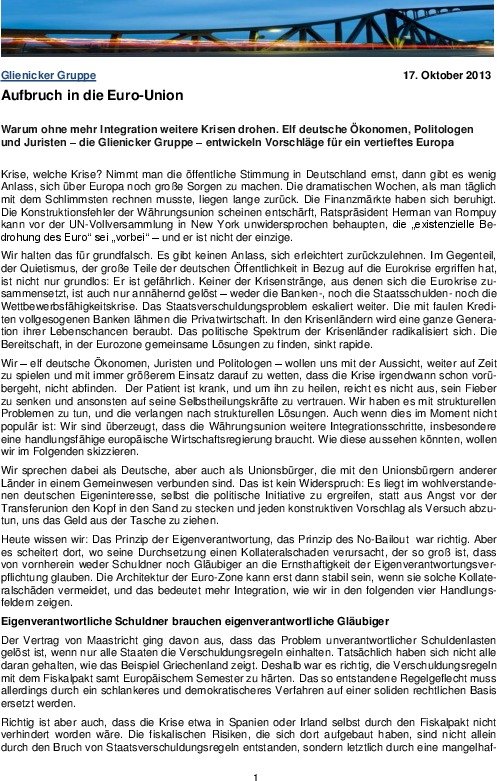External Publication
Aufbruch in die Euro-Union
Warum ohne mehr Integration weitere Krisen drohen. Elf deutsche Ökonomen, Politologen und Juristen – die Glienicker Gruppe – entwickeln Vorschläge für ein vertieftes Europa
This text is also available as a blog post ‘Towards a Euro Union‘ in English and as a pdf in French and German. See also the French Eiffel prosals ‘For a Euro Community‘ on our blog.
Glienicker Group: Armin von Bogdandy(Max-Planck-Institut for Comparative Law and International Law),Christian Calliess(FU Berlin),Henrik Enderlein(Hertie School of Governance),Marcel Fratzscher(DIW),Clemens Fuest(ZEW),Franz Mayer(Uni Bielefeld),Daniela Schwarzer(SWP),Max Steinbeis(Verfassungsblog),Constanze Stelzenmüller(German Marshall Fund), Jakob von Weizsäcker (Thüringer Wirtschaftsministerium),Guntram Wolff(Bruegel)
 Warum ohne mehr Integration weitere Krisen drohen. Elf deutsche Ökonomen, Politologen und Juristen – die Glienicker Gruppe – entwickeln Vorschläge für ein vertieftes Europa
Warum ohne mehr Integration weitere Krisen drohen. Elf deutsche Ökonomen, Politologen und Juristen – die Glienicker Gruppe – entwickeln Vorschläge für ein vertieftes Europa
Krise, welche Krise? Nimmt man die öffentliche Stimmung in Deutschland ernst, dann gibt es wenig Anlass, sich über Europa noch große Sorgen zu machen. Die dramatischen Wochen, als man täglich mit dem Schlimmsten rechnen musste, liegen lange zurück. Die Finanzmärkte haben sich beruhigt. Die Konstruktionsfehler der Währungsunion scheinen entschärft, Ratspräsident Herman van Rompuy kann vor der UN-Vollversammlung in New York unwidersprochen behaupten, die „existenzielle Bedrohung des Euro“ sei „vorbei“ – und er ist nicht der einzige.
 Sans plus d’intégration, de nouvelles crises se profilent. Onze économistes, politologues et juristes allemands – le Groupe Glienicker – élaborent des propositions pour une Europe approfondie.
Sans plus d’intégration, de nouvelles crises se profilent. Onze économistes, politologues et juristes allemands – le Groupe Glienicker – élaborent des propositions pour une Europe approfondie.
La crise? Quelle crise? Si l’on prend au sérieux l’opinion publique allemande, il n’y a pas vraiment de raison de s’inquiéter pour l’Europe. Les semaines dramatiques durant lesquelles on craignait que l’euro s’effondre sont loin derrière nous. Les marchés financiers se sont calmés. Les erreurs de construction de l’Union économique et monétaire (UEM) semblent désamorcées ; le président du Conseil européen, Herman Van Rompuy, peut annoncer devant l’Assemblée générale des Nations Unies à New York, sans être contredit, que « la menace pesant sur l’existence même de l’euro est derrière nous ».
 Without more integration, further crises are looming. Eleven German economists, political scientists and jurists – the Glienicker Group – develop proposals for a deeper Europe.
Without more integration, further crises are looming. Eleven German economists, political scientists and jurists – the Glienicker Group – develop proposals for a deeper Europe.
Crisis, what crisis? If public sentiment in Germany is anything to go by, there is little reason to worry about Europe. The period when it was feared that the euro might collapse seems a long time ago. Financial markets have calmed down. The design flaws of the monetary union seem to have been papered over, and European Council President Herman van Rompuy was able to claim, unchallenged, before the UN General Assembly in New York that the "existential threat to the euro" is over.








